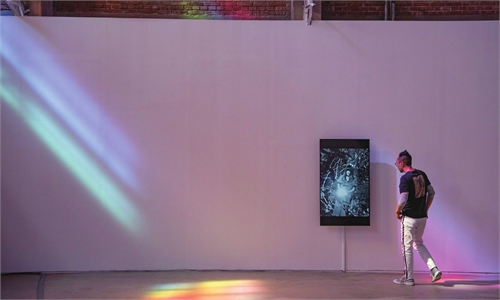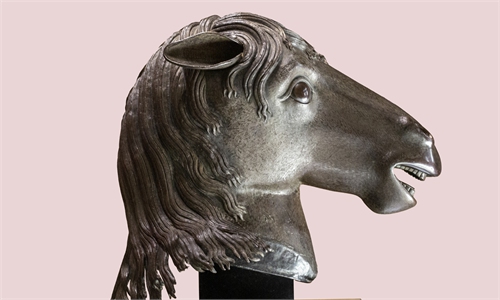
A woman looks at an NFT artwork by Mad Dog Jones titled SHIFT/ on June 10 in New York. Top: An NFT artwork by Ryoji Ikeda titled A Single Number That Has 10,000,086 Digits Photos: AFP
The Hangzhou Internet Court in East China's Zhejiang Province ruled on an non-fungible token (NFT) collection related lawsuit, which accepted NFT collections to be virtual assets and made judgement according to relevant law, the court announced via its official WeChat account recently.
The court said that NFT collections exhibit multiple characteristics including being valuable, rare, discretionary and tradable, and features belonging to virtual assets. In addition, the trade of NFT collections should be protected by law if the trade contract doesn't violate current laws.
According to the court, an NFT collection platform in February 2022 put on sale an NFT collection product with a detailed purchasing notice listing price, purchasing times and limit number of products available. The notice also stated that consumers must input verified personal phone number and ID number, or the order will be canceled.
A user of the platform surnamed Wang, sued the platform citing right infringement because an NFT collection priced 999 yuan ($143.15) was refunded after Wang placed the order, and requested the platform to execute the trade contract or compensate him 99,999 yuan. The platform said they canceled the order because Wang filled in an incorrect personal phone number.
The Hangzhou Internet Court dismissed Wang's claim because the trade contract of the NFT collection product was compliant, and the personal information provided by Wang when purchasing the product didn't meet the platform's requirements.
The court said that the NFT collection is a kind of virtual art work, generated by an artist's unique expression with intellectual property value attached, and should be identified as virtual assets.
In addition, the court ruled that the trade process relevant to the case should be regulated by China's e-commerce law.
The police department in Shangqiu, Central China's Henan Province revealed a crackdown on an NFT collection scam case involving more than 2.65 million yuan. According to local police, after receiving a tip-off, a group of eight members committed crimes by selling virtual cartoon pictures basing on mobile app platforms, and using so-called cashback, rewards and prize pool to scam more than 2.65 million yuan of income, the Chengdu Economic Daily reported on Novermber 20.
Legal experts said that the case was the first NFT collection related crime officially reported by a public security department, said the report.
The industry has grown rapidly in China in recent years with domestic leading players such as Alibaba and Tencent betting big on the emerging sector. Tencent launched an NFT trading platform named Huanhe in August 2021, whereas Alipay launched 8,000 limited-edition NFTs based on two pieces of artwork to commemorate ancient artwork from the Dunhuang Caves in June of last year which were sold out quickly after becoming available to the public.
Global Times


